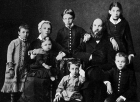World
The modern world cannot be studied without examining the course, impact and legacy of two world wars, the resources in this section set out to look at both the First and Second World Wars in their global context. The section also includes the Cold War and its impact in Latin America, South-East Asia and parts of Africa. This period also sees the rise and fall of European imperialism and the changing nature of global politics and economics as technology brings different stories from so many parts of the world directly to us. Read more
Sort by:
Date (Newest first) | Title A-Z
Show:
All |
Articles |
Podcasts |
Multipage Articles
-

Film: Lenin's origins
ArticleClick to view -

Film: Lenin, the 1905 Russian Revolution and WWI
ArticleClick to view -

Film: Rethinking the origins of the Cold War
ArticleClick to view -

Film: Stalin & the Great Terror
ArticleClick to view -

Film: Stalin - Early Life
ArticleClick to view -

Film: Stalin - Interpretations and Legacy
ArticleClick to view -

Film: Stalin - Rise to Power
ArticleClick to view -

Film: Stalin - The Early Soviet Economy & the preparation for war
ArticleClick to view -

Film: Stalin - World War II
ArticleClick to view -

Film: The Kennedys and the Gores
ArticleClick to view -

Film: Why does the massacre of the Armenians in the First World War still get overlooked?
ArticleClick to view -

Film: Yeltsin - Early Life
ArticleClick to view -

Film: Yeltsin and Russia in the late 1980s
ArticleClick to view -

Film: Yeltsin and the Oligarchs
ArticleClick to view -

Film: Yeltsin and the West
ArticleClick to view -

Film: Yeltsin and the fall of the Soviet Union
ArticleClick to view -

Film: Yeltsin's agenda
ArticleClick to view -

Film: Yeltsin's second term and legacy
ArticleClick to view -

Filmed Lecture: Medlicott Lecture 2021 - Rana Mitter
ArticleClick to view -

Filmed Lecture: Medlicott Lecture 2022 - David Olusoga
ArticleClick to view

